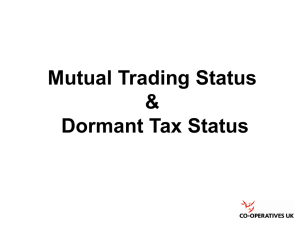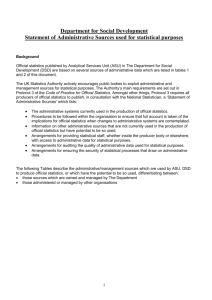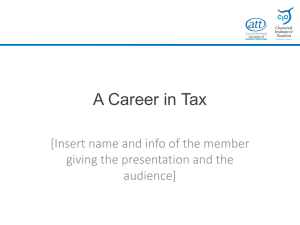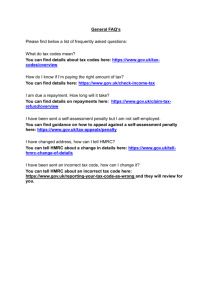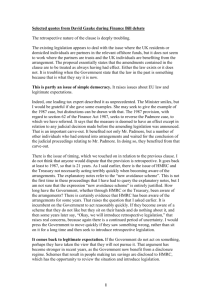Consultation: Extra-Statutory Concession A19 review
advertisement
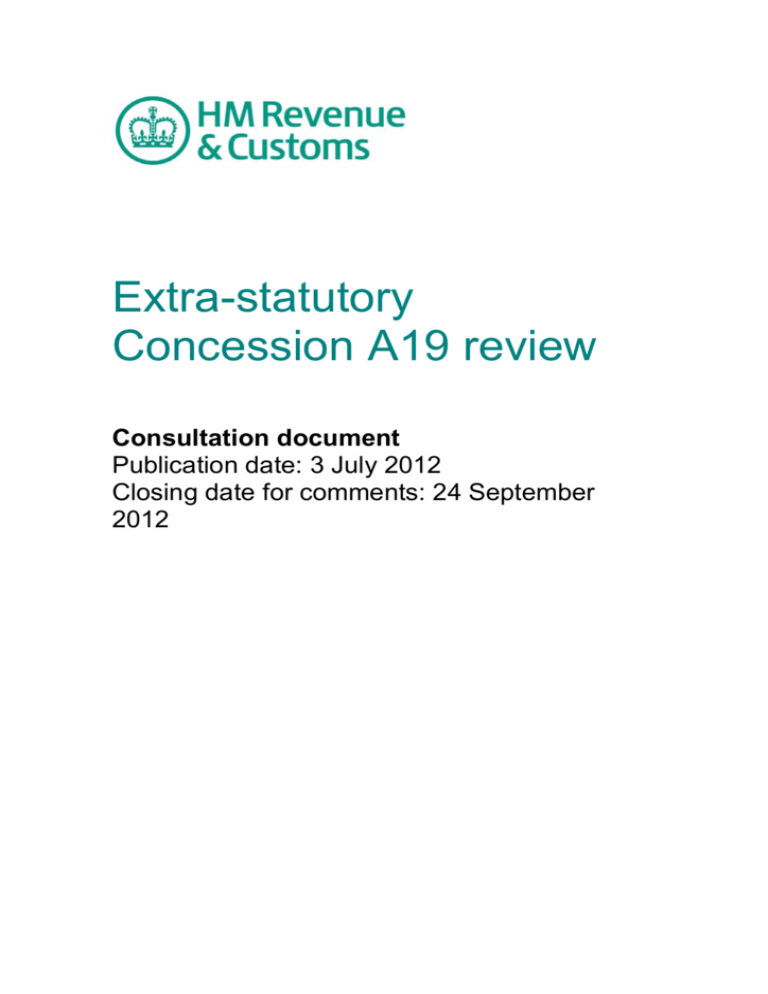
Extra-statutory Concession A19 review Consultation document Publication date: 3 July 2012 Closing date for comments: 24 September 2012 Subject of this consultation: Proposal for the revision of Extra-statutory Concession A19. Scope of this consultation: The consultation is designed to explore the option for a revised version of Extra-statutory Concession (ESC) A19. It is not intended to cover whether ESC A19 should exist or the scope of concessions, but rather how HMRC may be able to improve the clarity of this particular concession ensuring it continues to be applied appropriately. Who should read this: Interested parties with a liability to income tax. Duration: 3 July 2012 to 24 September 2012 Lead official: Angela Brown, HM Revenue and Customs How to respond or enquire about this consultation: Collated responses from relevant representative associations on behalf of their members are welcomed. Alternatively, individuals may respond separately to any part of this consultation. Please send responses (or enquiries about the content or scope of the consultation, requests for hard copies, or information about consultation events): By post to: Angela Brown, Room 1E/07, HM Revenue and Customs, 100 Parliament Street, London SW1A 2BQ By email to: paye.policy@hmrc.gsi.gov.uk Additional ways to be involved: Please use the contact details above if you need a large print or Braille version, or if you need the document in a different language. After the consultation: HMRC will publish a summary of responses on the HMRC website. Any decisions to proceed with the proposed revised version will be taken in the light of the consultation. Getting to this stage: The proposal builds on HMRC's work to date focused on improving the application of Extra-statutory Concession A19. Previous engagement: There has been previous discussion on this topic with representative bodies and stakeholders. 2 Contents 1 Introduction 4 2 Background to ESC A19 5 3 Current text of ESC A19 7 4 Proposed changes to ESC A19 8 5 Summary of Consultation Questions 14 6 The Consultation Process: How to respond 15 The Code of Practice on Consultation 17 Annex A 3 1. Introduction What is an Extra-statutory Concession? 1.1. Extra-statutory Concessions ("ESCs") have been a feature of the UK's tax system for over 40 years. An ESC is a relaxation which provides taxpayers with a reduction in tax liability which they would not be allowed under the strict letter of the law. HMRC uses its 'collection and management' powers to operate such concessions and each ESC has defined criteria which provide for when such powers may be exercised. 1.2. ESC A19 sets out how HMRC may exercise its discretion not to collect income and capital gains tax which is lawfully payable, due to HMRC's delay in acting on relevant information in prescribed circumstances. This includes where the taxpayer identifies that HMRC did not properly deal with information received and the HMRC delay is the cause of an underpayment. HMRC is keen to ensure that this concession continues to apply in appropriate cases and that taxpayers understand it. 1.3. Chapter 2 provides further information on the nature and operation of ESC A19. Reasons for this consultation 1.4. Following extended discussion with representative bodies HMRC has concluded that a consultation on ESC A19 now will be an opportunity to: (i) improve the clarity of ESC A19 so that it is more user-friendly and easily understood by taxpayers; (ii) help HMRC bring greater objectivity to ESC A19; and, (iii) help HMRC align ESC A19 with the HMRC Charter and ensure that it continues to be available in appropriate cases. 1.5. The consultation aims are to present and seek views on a revised version of ESC A19 which: (i) introduces the concept of 'taxpayer responsibilities' in respect of ESC A19 claims against the recovery of underpaid income tax in line with the HMRC Charter; and, (ii) removes reference to capital gains tax, on the basis that the requirement for individuals to self-assess for capital gains makes ESC A19 redundant. Next steps 1.6. The period of consultation will run from 3 July to 24 September 2012, lasting a total of 12 weeks. Responses are invited from all interested parties, individuals and representative associations. HMRC would particularly welcome views from the Parliamentary Ombudsman and the Adjudicator's Office. 1.7. All responses will be collated and analysed to inform any subsequent decisions, with a summary of key findings to be published later in 2012. If a new version of ESC A19 is adopted the intention is for it to be operative from 6 April 2013 and to apply in respect of income tax underpayments notified in the tax year 2013-14 onwards. 4 2. Background to ESC A19 Pay As You Earn (PAYE) and ESC A19 2.1. The Pay As You Earn (PAYE) system aims to deduct the right amount of tax from individuals during the course of the tax year and is based on information that employees and employers provide to HMRC. 2.2. PAYE takes the right amount of tax from the majority of individuals. But for those who move in and out of work, have fluctuating income, or have expenses and benefits, PAYE deductions do not always equal the tax due. This is largely because the tax affairs for this group of individuals can change in-year and the changes may not be reported to HMRC until some time after the event. This means that in any tax year around a small proportion of individuals have paid too much or too little tax. 2.3. At the end of each tax year, HMRC checks whether individuals within the PAYE system have paid the right amount of tax. If too much or too little tax has been paid a tax calculation, on form P800, will be produced and sent to the individual. This is known as End of Year Reconciliation. 2.4. If an individual has paid too much tax after End of Year Reconciliation has taken place, individuals will receive a refund from HMRC. 2.5. Those individuals with more tax to pay will receive a notification from HMRC and in the vast majority of cases HMRC will collect the additional tax owed through PAYE by altering their tax code. This is known as 'coding out' and will take place in the following tax year. For example if an individual has underpaid tax in the tax year 2011-12 then 'coding out' will begin in the tax year 2013-14 (beginning 6 April 2013). 2.6. ESC A19 is relevant to those individuals who receive a P800 tax calculation and have been notified by HMRC that they have underpaid tax or have received an overrepayment of tax. Operation of ESC A19 2.7. ESC A19 currently allows income tax and capital gains tax to be 'given up' (i.e. not collected) where: a. HMRC has failed to act on information received from the taxpayer or a relevant third party in a timely manner, resulting in arrears; and, b. HMRC notified the taxpayer of the arrears more than 12 months after the end of the tax year in which information was received; and, c. The taxpayer could 'reasonably have believed' that their tax affairs were in order. 2.8. ESC A19 also includes provision for ‘exceptional circumstances’ in which tax arrears notified within 12 months after the end of the tax year can be considered in prescribed circumstances. The circumstances which make a case ‘exceptional’ are that HMRC: 5 a. Failed more than once to make proper use of the facts they had been given about one source of income; and, b. Allowed the tax arrears to build up over two whole tax years in succession. 6 3. Current text of ESC A19 Current text of ESC A19 3.1. The current text of ESC A19 is as follows: Extra-statutory Concession A19 Arrears of income tax and capital gains tax may be given up if they result from the failure of HMRC to make proper and timely use of information supplied by A taxpayer about his or her own income, gains or personal circumstances Or An employer, if the information affects a taxpayer's coding Or The Department for Work and Pensions (DWP), about a taxpayer's state retirement, disability or widow's pension Tax will normally be given up only if the taxpayer Could reasonably have believed that his or her tax affairs were in order And Was notified of the arrears more than 12 months after the end of the tax year in which HMRC received the information indicating that more tax was due Or Was notified of an over-repayment after the end of the tax year following the year in which the repayment was made In exceptional circumstances arrears of tax notified 12 months or less after the end of the relevant tax year may be given up if HMRC Failed more than once to make proper use of the facts they had been given about one source of income Allowed the arrears to build up over two whole tax years in succession by failing to make proper and timely use of information they had been given End of text 7 4. Proposed changes to ESC A19 Proposed revised text of ESC A19 4.1. HMRC has proposed revised text for ESC A19 with the objective of replacing the current text (as detailed in chapter 3). 4.2. The proposed revised text for ESC A19 is as follows: Extra-statutory Concession A19 Introduction Extra-statutory Concession (ESC) A19 allows HMRC to not collect underpaid income tax in certain circumstances. An underpayment arises when an individual has not paid the right amount of income tax on their earnings. When Extra-statutory Concession (ESC) A19 applies An individual can request HMRC to apply ESC A19 if they believe that the underpayment has arisen because, following HMRC's receipt of information from the individual, their employer or the Department for Work and Pensions (DWP): HMRC failed to issue a tax code, or, HMRC issued an incorrect tax code, or, HMRC incorrectly repaid tax. For HMRC to apply ESC A19, HMRC expects taxpayers to meet their responsibilities (as set out below) and for the following two circumstances to have occurred: HMRC notified the individual of the underpayment more than 12 months after the end of the tax year in which the information was received indicating that more tax was due or that the incorrect repayment was made; and, HMRC did not meet its responsibilities in dealing with information provided to them (see below for what HMRC's responsibilities are and what counts as 'information'). Example: Mr Smith underpaid income tax in the tax year 2015-16 because HMRC received information which it failed to deal with in that tax year. HMRC informed him of the underpayment after 5 April 2017. Subject to the responsibilities tests set out below, Mr Smith can ask HMRC to apply ESC A19. 8 Why an underpayment of income tax happens Underpayments can arise for a number of reasons and are not always due to HMRC or taxpayer fault. Sometimes an underpayment can arise because of the use of a temporary tax code or emergency code. Typical reasons for underpaid income tax include: An individual or employer giving HMRC wrong information about a change in circumstances or income An individual or employer not informing HMRC about a change of circumstances An employer or pension payer using an emergency tax code HMRC making a mistake when they record the information they are given HMRC not acting on the information they are given Responsibilities tests To ensure that the right amount of tax is paid it is important that HMRC meets its responsibilities and that an individual meets theirs. For the purposes of the proposed revision to ESC A19 and its future application HMRC is suggesting that HMRC and the individual need to meet a series of objective responsibilities. HMRC's responsibilities When HMRC receives information regarding an individual's tax affairs HMRC should: issue a tax code or amend the individual's tax code where they are in possession of relevant facts sent to them by an individual accurately record and use the information provided as part of the annual PAYE reconciliation process Taxpayer responsibilities As set out in the HMRC Charter HMRC expects individuals to take responsibility for getting things right even if they have authorised someone to act on their behalf. HMRC expects individuals to: Tell it about any changes in their circumstances that will affect their payments or claims. Check their tax code to ensure the information included is correct and up to date. Sometimes where there has been a change in personal circumstances, it might not be clear whether it has an effect on the amount of income tax an individual has to pay. If an individual is unsure as to whether a change of circumstance affects their tax code they should contact HMRC. 9 Taxpayers should also keep a note of the date they contacted HMRC, the name of the person they spoke to and details of the change they reported and, where appropriate, provide records that support what they tell HMRC. What counts as 'information'? HMRC can receive information relating to a change of circumstance or income from: An individual, An employer, or, The Department for Work and Pensions (DWP). The following and no other information will be treated as relating to a change of circumstance or income. From the individual From the employer 1. Direct communication from a taxpayer (or someone authorised to act on their behalf) informing HMRC about a change in income, allowances, benefits or personal circumstances. 1. Form P45* 2. Form P46* 3. Form P46 (Pen)* 4. Form P46 (Car) 5. Form P11D From the Department for Work and Pensions 1. Form P46 (DWP) 2. Form P46 (IB) *or the equivalent information provided under a Real Time Information submission Is there a time limit for ESC A19 to apply? Where an individual thinks ESC A19 may apply they should contact HMRC as soon as possible. This must be before the start of the tax year in which the underpaid tax will be collected through the tax code. If underpaid tax cannot be reflected in a change to their tax code then the individual should contact HMRC as soon as possible and in any event, before the end of the tax year in which the P800 Tax Calculation was issued. Example: HMRC notifies Mrs Smith of an underpayment for the tax year 2015-16 by sending her a P800 Tax Calculation on 1 June 2017. Mrs Smith considers it was HMRC’s failure to deal with information which led to the underpaid tax. Mrs Smith should contact HMRC: as soon as possible after receiving the P800, or, upon receiving her Tax Code Notice for 2018-19, but in any case, before 6 April 2018. 10 If Mrs Smith fails to contact HMRC by 6 April 2018 then HMRC will not be required to look at ESC A19 after that date. Although HMRC may have contributed to the underpayment, it is still tax which is correctly due from Mrs Smith. End of text 11 Proposed changes to ESC A19 4.3. HMRC welcomes views on this revised version of ESC A19, and has highlighted certain areas below in which it is particularly interested. Taxpayer responsibilities 4.4. The proposed revised version of ESC A19 removes reference to 'reasonable belief' and introduces the idea of 'taxpayer responsibilities'. HMRC has introduced a set of responsibilities which HMRC considers to be a more objective measure to decide whether HMRC should not pursue the tax owed. HMRC expects taxpayers to have a certain basic level of knowledge about their own tax affairs and a set of responsibilities allows HMRC to objectively assess the taxpayer's position. 4.5. Do you agree with the removal of the 'reasonable belief' test to be replaced with an objective test based around 'taxpayer responsibilities'? HMRC responsibilities 4.6. The proposed revised version of ESC A19 introduces objective HMRC responsibilities. These are, for the purpose of collection of tax through the PAYE coding system, that HMRC ensures it accurately records information and ensures that either a tax code is issued or a tax code is amended to reflect the additional tax which should be collected. A table detailing the forms that HMRC receive to amend a tax code has also been added to the revised concession. 4.7. Do you think that the introduction of HMRC responsibilities makes it clearer in regard to what information HMRC must act on? Has HMRC identified the correct responsibilities and/or are there others that should be included? 'Exceptional Circumstances' test 4.8. The 'Exceptional Circumstances' section has been removed in the revised text. As HMRC’s End of Year Reconciliation process now works on a continuous cycle after the end of the tax year, HMRC considers that there will be fewer instances where exceptional circumstances under its present form will occur and arrears build up over two whole tax years. 4.9. Do you agree that the 'Exceptional Circumstances' section is now redundant and can be removed from ESC A19? If not, for what circumstances do you think it should be retained? Capital gains tax 4.10. The proposed revised version of ESC A19 applies only to income tax and removes reference to capital gains tax (CGT). This is because in most cases CGT notification of liability is through a taxpayer's own self-assessment return. 12 4.11. ESC A19 rarely applies to those in Self Assessment (SA) because under SA the individual determines their own tax position and therefore unlikely to fall within the remit of ESC A19. 4.12. Can you identify any issues with the removal of CGT from ESC A19? HMRC would be particularly interested to hear examples of where a recent request has been made in relation to CGT and ESC A19. Time limit for applying ESC A19 4.13. HMRC believes that taxpayers should show an interest in their tax affairs and take personal responsibility to ensure their tax affairs are correct. Where a taxpayer receives a Tax Calculation detailing an underpaid amount of tax, HMRC expects that if there is any dispute by the taxpayer that HMRC caused the error that the taxpayer approaches HMRC as soon as possible. 4.14. As the timing of issue of Tax Calculations can occur throughout the tax year, HMRC believe that a reasonable time limit for a taxpayer to contact HMRC is before the underpayment is collected within the next tax year. This gives the majority of taxpayers sufficient time to contact HMRC. 4.15. Difficulties arise where some taxpayers leave a matter for a significant period of time, as it is harder for both the taxpayer and HMRC to determine if HMRC delay was in fact a contributory factor leading to the underpayment. 4.16. Do you agree with introducing a time limit for individuals to contact HMRC? Can you identify any issues with HMRC adopting this approach? Other considerations 4.17. HMRC plans to issue supporting guidance alongside the revised wording. What format would be most appropriate for this? For example, online guidance, a Question and Answer document or updates in the PAYE Online Manual. 4.18. Are there any terms within the revised concession which you feel require further explanation or expansion? 4.19. Chapter 6 provides information on how you are able to respond to this consultation. 13 5. Summary of Consultation Questions Taxpayer responsibilities 5.1. Do you agree with the removal of 'reasonable belief' to be replaced with an objective test based around 'taxpayer responsibilities'? HMRC responsibilities 5.2. Do you think that the introduction of HMRC responsibilities makes it clearer in regard to what information HMRC must act on? Has HMRC identified the correct responsibilities and/or are there others that should be included? 'Exceptional Circumstances' test 5.3. Do you agree that the 'Exceptional Circumstances' section is now redundant and can be removed from ESC A19? If not, for what circumstances do you think it should be retained? Capital gains tax 5.4. Can you identify any issues with the removal of CGT from ESC A19? HMRC would be particularly interested to hear examples of where a recent request has been made in relation to CGT and ESC A19. Time limit for requesting HMRC looks at ESC A19 5.5. Do you agree with introducing a time limit for individuals to contact HMRC? Can you identify any issues with HMRC adopting this approach? Other considerations 5.6. HMRC plans to issue supporting guidance alongside the revised wording. What format would be most appropriate for this? For example, online guidance, a Question and Answer document or updates in the PAYE Online Manual. 5.7. Are there any terms within the revised concession which you feel require further explanation or expansion? 14 6. The Consultation Process This consultation is being conducted in line with the Tax Consultation Framework. There are 5 stages to tax policy development: Stage 1 Setting out objectives and identifying options. Stage 2 Determining the best option and developing a framework for implementation including detailed policy design. Stage 3 Drafting legislation to effect the proposed change. Stage 4 Implementing and monitoring the change. Stage 5 Reviewing and evaluating the change. This consultation is taking place during stage 3 of the process. The purpose of the consultation is to seek views on the draft concession in order to confirm, as far as possible, that it will achieve the intended policy effect with no unintended effects. Please note that this is not a consultation on a legislative change since this is an extra-statutory concession, which by its nature does not require legislation. How to respond A summary of the questions in this consultation is included at chapter 5. Responses should be sent by 24 September 2012, by e-mail to paye.policy@hmrc.gsi.gov.uk or by post to: Angela Brown, Room 1E/07, 100 Parliament Street, London SW1A 2BQ. Paper copies of this document or copies in Welsh and alternative formats (large print, audio and Braille) may be obtained free of charge from the above address. This document can also be accessed from the HMRC Internet site at http://www.hmrc.gov.uk/consultations/index.htm. All responses will be acknowledged, but it will not be possible to give substantive replies to individual representations. When responding please say if you are a business, individual or representative body. In the case of representative bodies please provide information on the number and nature of people you represent. Confidentiality Information provided in response to this consultation, including personal information, may be published or disclosed in accordance with the access to information regimes. These are primarily the Freedom of Information Act 2000 (FOIA), the Data Protection Act 1998 (DPA) and the Environmental Information Regulations 2004. If you want the information that you provide to be treated as confidential, please be aware that, under the FOIA, there is a statutory Code of Practice with which public 15 authorities must comply and which deals with, amongst other things, obligations of confidence. In view of this it would be helpful if you could explain to us why you regard the information you have provided as confidential. If we receive a request for disclosure of the information we will take full account of your explanation, but we cannot give an assurance that confidentially can be maintained in all circumstances. An automatic confidentiality disclaimer generated by your IT system will not, of itself, be regarded as binding on HM Revenue and Customs (HMRC). HMRC will process your personal data in accordance with the DPA and in the majority of circumstances this will mean that your personal data will not be disclosed to third parties. The Consultation Code of Practice This consultation is being conducted in accordance with the Code of Practice on Consultation. A copy of the Code of Practice criteria and a contact for any comments on the consultation process can be found in Annex A. 16 Annex A: The Code of Practice on Consultation About the consultation process This consultation is being conducted in accordance with the Code of Practice on Consultation. The consultation criteria 1. When to consult - Formal consultation should take place at a stage when there is scope to influence the policy outcome. 2. Duration of consultation exercises - Consultations should normally last for at least 12 weeks with consideration given to longer timescales where feasible and sensible. 3. Clarity of scope and impact - Consultation documents should be clear about the consultation process, what is being proposed, the scope to influence and the expected costs and benefits of the proposals. 4. Accessibility of consultation exercise - Consultation exercises should be designed to be accessible to, and clearly targeted at, those people the exercise is intended to reach. 5. The burden of consultation - Keeping the burden of consultation to a minimum is essential if consultations are to be effective and if consultees’ buy-in to the process is to be obtained. 6. Responsiveness of consultation exercises - Consultation responses should be analysed carefully and clear feedback should be provided to participants following the consultation. 7. Capacity to consult - Officials running consultations should seek guidance in how to run an effective consultation exercise and share what they have learned from the experience. If you feel that this consultation does not satisfy these criteria, or if you have any complaints or comments about the process, please contact: Amy Burgess, Consultation Coordinator, Budget & Finance Bill Co-ordination Group, HM Revenue & Customs, 100 Parliament Street, London, SWA 2BQ e-mail hmrc-consultation.co-ordinator@hmrc.gsi.gov.uk 17

